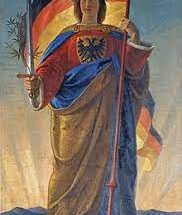Question-Through a focus on any two countries, explain how nations developed over the nineteenth century.
Answer-
The development of nations in the nineteenth century can be exemplified through the unification processes of Germany and Italy, which were marked by strategic statecraft, wars, and the mobilisation of nationalist sentiments.
Germany
- Shift from Liberal Nationalism- After the events of 1848, nationalism in Europe transitioned from being associated with liberal, democratic, and revolutionary ideals to being utilised by conservative forces to enhance state power and political dominance.
- Initial Liberal Efforts- In 1848, middle-class Germans, driven by nationalist sentiments, attempted to consolidate the various regions of the German Confederation into a single nation-state governed by a democratically elected parliament. This movement aimed to establish a political structure that represented the collective will of the German people.
- Suppression by Conservative Forces- The liberal movement faced significant opposition and was ultimately suppressed by the combined forces of the monarchy, military, and large landowners, known as Junkers, particularly from Prussia. This suppression marked a turning point where the control of nationalist movements shifted towards more conservative and authoritarian elements within German society.
- Prussian Leadership- Following the failure of the liberal initiative, Prussia, under the leadership of its chief minister Otto von Bismarck, assumed a central role in the movement for national unification. Bismarck’s strategy diverged from the liberal approach, emphasising realpolitik and state power over democratic principles.
- Bismarck’s Diplomacy and Warfare- Bismarck orchestrated the unification process through a series of strategic wars against Austria, Denmark, and France over seven years. These conflicts, while militaristic in nature, were carefully managed to achieve political ends, ultimately leading to Prussian victories that paved the way for German unification.
- Proclamation of the German Empire- The successful unification efforts culminated in the proclamation of the German Empire in January 1871, with the Prussian king, William I, being declared the German Emperor in a ceremony at Versailles. This event marked the official establishment of Germany as a unified nation-state under Prussian dominance.
- Modernization Efforts- The newly formed German state, now unified under Prussian leadership, embarked on a comprehensive modernization campaign. This included reforms in the currency, banking, legal, and judicial systems, with Prussian measures serving as models for the rest of Germany. These efforts aimed to consolidate the nation-state’s power and efficiency, reflecting the conservative and authoritarian nature of the unification process under Bismarck.
Italy
- Political Fragmentation- Italy was divided into several states with only Sardinia-Piedmont under Italian rule. The north was under Austrian control, the centre by the Pope, and the south by the Bourbon kings of Spain. The Italian language varied significantly across regions, further complicating the sense of a unified national identity.
- Giuseppe Mazzini’s Role- Mazzini, a prominent figure in the early movements for Italian unification, envisioned a united Italian Republic. He founded the Young Italy society to spread nationalist ideals. Despite the failure of initial uprisings, Mazzini’s ideas significantly influenced the unification movement.
- Sardinia-Piedmont’s Leadership- With the failure of revolutionary uprisings, the unification efforts shifted to Sardinia-Piedmont under King Victor Emmanuel II. The region’s ruling elite saw unification as a means to economic development and political dominance.
- Cavour’s Diplomacy- Count Camillo di Cavour, the Chief Minister of Sardinia-Piedmont, was instrumental in the unification. Not a revolutionary or democrat, Cavour strategically aligned with France to defeat Austrian forces, paving the way for unification.
- Garibaldi’s Expedition- Giuseppe Garibaldi, a key military leader in the unification, led the Expedition of the Thousand in 1860. With a growing force, they successfully gained the support of local peasants in southern Italy, contributing significantly to the unification efforts.
- Proclamation of the Kingdom of Italy- In 1861, the successful campaigns led to the proclamation of Victor Emmanuel II as the king of a unified Italy. However, the majority of the Italian population, largely illiterate, remained largely unaware of the liberal-nationalist ideologies driving the unification.
- Lack of Widespread Awareness- Despite the political unification, much of the Italian population was not fully aware of or involved in the nationalist movements. The anecdote of southern Italian peasants mistaking “Italia” for Victor Emmanuel’s wife illustrates the limited reach of nationalist ideology among the general populace.
Also Check – The Role of Women in Nationalist Struggles – Short note
Also Check – The Frankfurt Parliament
Also Check – Giuseppe Mazzini – Italian Revolutionary thinker
Also Check – Giuseppe Garibaldi- Italian freedom fighter
Also Check – Count Camillo de Cavour
Also Check – The Rise of Nationalism in Europe- 39 Mcqs
Also Check – The Rise of Nationalism in Europe – Class 10 – Notes
Also Check – Otto von Bismarck- Architect of German Unification
Also Check – Briefly trace the process of German unification
Also Check – Napoleon and the Napoleonic Code- Impact on European Societies and Legal Systems
Also Check – Why did Nationalist Tensions Emerge in the Balkans?
